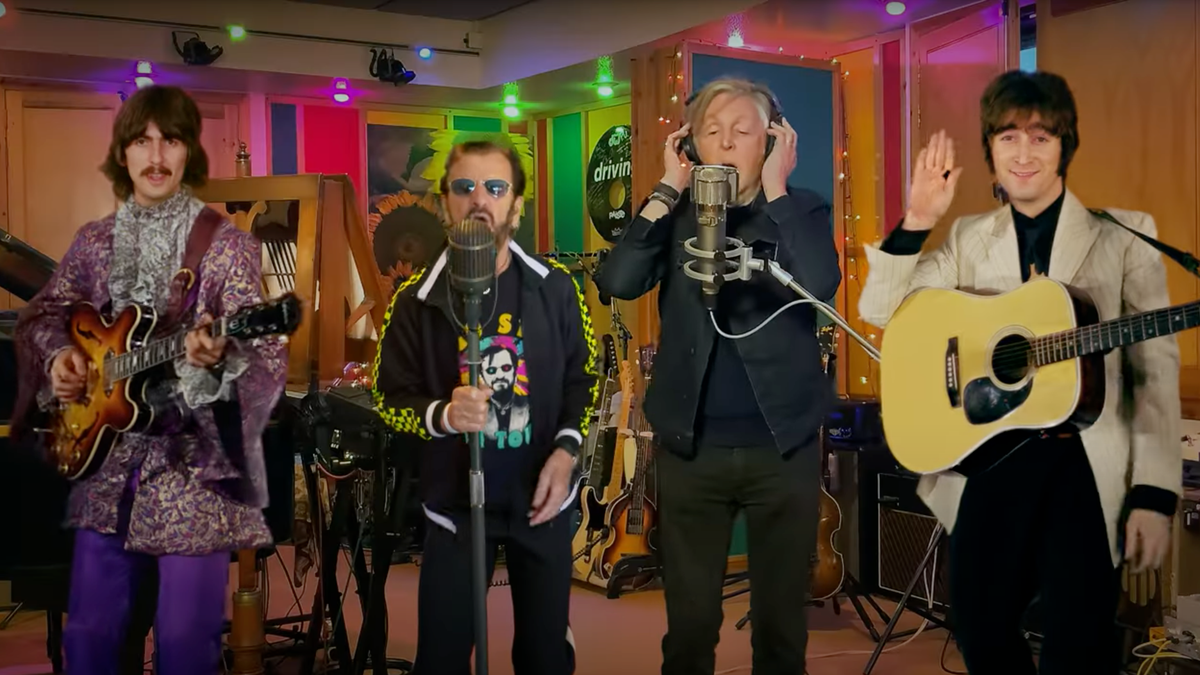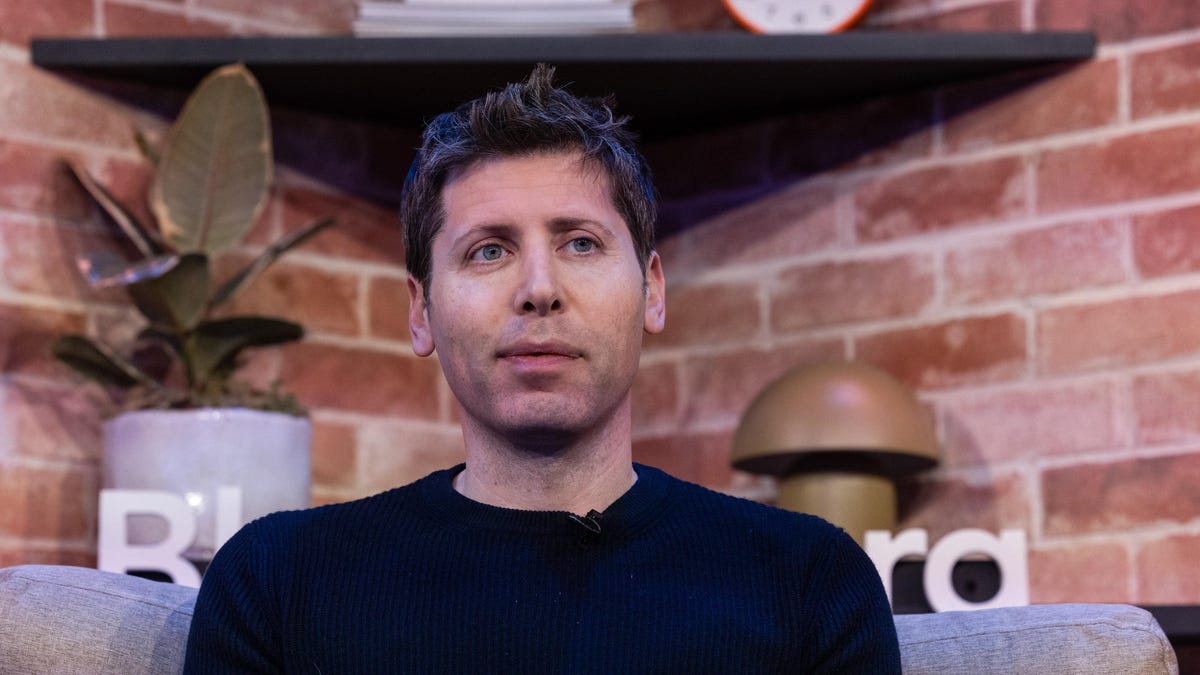You have an opportunity. If you turn back now, you can live out the rest of your days without absorbing the cosmic horror that is the music video for “Now and Then,” or as Paul McCartney’s marketing team puts it, “the last Beatles song.”
“Now and Then” is a new Beatles track cobbled together with the eldritch power of AI. It’s built on a demo tape recorded by John Lennon in 1978. In the ‘90s, the surviving members of the Beatles reunited to work on three unreleased Lennon songs, adding new vocals and instrumentals. Two of them, “Real Love” and “Free As A Bird,” were released as part of The Beatles Anthology. Paul, George, and Ringo started on “Now and Then,” but abandoned the song because the quality of Lennon’s demo was too muddy to deal with.
George Harrison died in 2001, and as Paul put it, the last Beatles song “languished in a cupboard.” But in the decades since then, technology has improved. New developments in AI and machine learning let engineers isolate Lennon’s voice from the “Now and Then” demo, and over the last year, Paul and Ringo teamed up to finish the song.
Lord of the Rings director Peter Jackson, who led 2021’s masterful Beatles documentary Get Back, was tasked with creating a music video for “Now and Then.” Together, Jackson and the last two Beatles made what will surely go down as some of the worst artistic decisions in the history of pop culture.
The music video opens with footage of the ‘90s studio sessions. Ringo sets up behind a drum set. George tunes an acoustic guitar. Paul frets his signature violin bass. So far, so good. The aging Beatles start playing. Of course, Lennon, who died more than ten years before the ‘90s sessions, is absent. We see someone hit play on a cassette, and his frail vocal calls out from the past:
“I know it’s true,
It’s all because of you,
And if I make it through,
It’s all because of you.”
Footage of Lennon staring out at an ocean sunset fades in, superimposed with a photo of the Fab Four at the height of their powers in the early ‘60s. After a few bars, we see McCartney singing in 2023, joining his friend in harmony.
It’s all a bit maudlin, but excusably so, the kind of thing you might see at a funeral or an “In Memoriam” segment at the Oscars. There are shots of the lads at various happy times in their lives: John in a chic cowboy hat on the streets of New York; a mop-topped George looking into the camera.
As we get to the chorus, all four Beatles sing together. A contemporary Ringo and Paul stand at microphones in a studio. Ringo hams it up for the camera in a shirt with his own face on it:
“Now and then,
I miss you,
Oh, now and then,
I want you to be there for me,
Always to return to me.”
Then, at a minute and 47 seconds, the torture starts.
Suddenly the camera pulls back, and Paul and Ring are joined by specters of two famous ghosts. It’s 1960s footage of George and John, stitched together to make it seem like the four of them are all playing together in the studio. Standing next to the octogenarian surviving bandmates are a young George, playing his guitar in purple tights and a psychedelic blouse, and John, making goofy faces and waving his hands at the camera. This vision from across the uncanny valley is startling, and not in a fun way. The dead Beatles smirk, an homage to the cheeky, self-effacing humor that made the boys so irresistible in the first place.
To be fair to the poor Beatles, and I do love their work, Paul McCartney and Ringo Starr are old men. “Now and Then” is a tribute to lost friends who died before their time. (Harrison passed at 58. Lennon was murdered at 40.) John’s lyrics were already sentimental, and for Paul and Ringo, the project must have been terribly sad work.
I went into the video in a forgiving mood. There’s no way for a piece of art like this to be truly great in the traditional sense. It’s a nostalgia project, a message of love, and maybe some closure for the fans. But this isn’t charming or cute. It’s tactless, gruesome, and undeniably disturbing. If you want to be generous — far more generous than this video deserves — the kindest word you should call it is embarrassing.
Footage of George playing guitar in his St. Pepper’s costume is spliced next to a haggard-looking George laying down his guitar track in the ‘90s. The ghost of a 20-something John points at the 81-year-old Paul’s microphone, and pretends to conduct the orchestra playing the song’s overly-sentimental strings. Beatles of all ages are CGI’d together at the same time, taking apart Ringo’s drums as he plays.
The A.V. Club’s Mary Kate Carr said the dropped-in shots of the younger Beatles look “more like when someone adds a sticker GIF to their Instagram Story than a Peter Jackson-worthy visual effect.” It leaves an already challenging song impossible to enjoy, and frankly, feels like a bit of an insult to their memory. They were Paul and Ringo’s friends, not mine, and the estates of John and George were involved in the project, so maybe that’s none of my business.
Most reviews of the new song and its accompanying video are positive. Pitchfork, famous for its scathing critiques, couldn’t muster anything crueler than it “could have been a lot worse.” Sure. People want to like the Beatles, and so do I. As a kid, I learned guitar playing their songs. I watched the movies and read the books. I paid for all of the increasingly cynical box sets and listened to their albums in mono, like God intended. But let’s be honest with each other: this is an abomination.
Humanity has developed tools that we don’t have the responsibility or good taste to wield. With the power of computers and AI, we can now create art that goes beyond the limits of the physical world and even human imagination. There is no sound or image that you can’t create right now at home with your laptop.
Compare that to the era that gave us the Beatles. The most advanced technology available to the band in their early days was microphones and electric guitars, analog tools made of magnets and wire that amplified sounds you made with your body. Where the Beatles shined was pushing those tools to their extremes. They were constrained by creative boundaries, pressing up against the limits of technology to squeeze out every possible drop of artistic expression. The band recorded its 1963 debut Please Please Me in a single day on a two-track recording machine, doing most of the album live to tape with few overdubs.
Peter Jackson said he has “genuine pride” in his first-ever music video, “and I’ll cherish that for years to come.” If that’s how he really feels, we should take his cameras away and let him think about what he’s done.
It’s painful to accept, but all things must pass. The Beatles are over and John and George are gone. On some sad day in the future, Paul and Ringo will also be dead. I pray that capitalism lets them stay that way.








